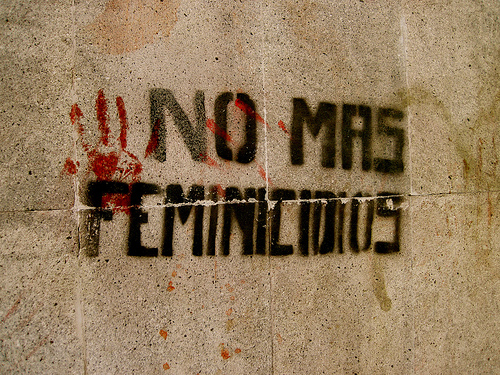Violeta, an 18-year-old student, was found [es] dead on a dirt road in the state of Chiapas with signs of violence on her body. Meanwhile, in the state of Guanajuato, the body of another woman named Olga was found [es] partially buried and covered in lime. She appeared to have been strangled.
These two women, who were discovered in April 2013, were just two of the latest victims of a dramatic spike in deadly violence against women in many parts of Mexico.
According to Martha Figueroa [es], from the Women's Collective of San Cristóbal de las Casas, femicides are on the rise this year; so far in 2013, 26 women have suffered violent deaths in Chiapas, and of those at least 20 are considered femicides. In 2012, the same organization registered [es] 85 femicides in Chiapas. This month, Guanajuato's Attorney General Carlos Zamarripa reported [es] 24 femicides “in recent weeks” in that state. While in the northern state of Chihuahua –- a state known for the horrific femicide cases of Ciudad Juarez — 73 women were murdered in one year, from March 2012 to March 2013.
The mothers of these victims as well as women's rights activists are now taking to the street to demand justice as femicides continue unpunished, sometimes risking their own lives in doing so. InCiudad Juárez about six human rights defenders were forced to leave the city this month to protect their lives.
The reason? They demand to know why their daughters were killed.
Anaiz Zamora Márquez, from the Mexican news organization CIMAC, recounted for her readers [es] a recent march against the impunity surrounding Ciudad Juarez's female homicides is not easily forgotten:
Hace un mes en DF el dolor de las madres y familiares de jóvenes desaparecidas en Ciudad Juárez se extendió por esta capital, y en una protesta de más de cuatro horas el silencio de 20 años de impunidad y autoridades incompetentes se transformó en reclamo de justicia.
One month ago in Mexico City, the pain of mothers and families of missing young women in Ciudad Juarez swept the capital, and in a protest of more than four hours, the silence of 20 years of impunity and incompetent authorities was transformed in order to demand justice.
Anaiz describes the authorities’ response to the march:
La tarde caía y al grito de “¡Vivas se las llevaron, vivas las queremos!” las madres y sus acompañantes se encaminaron sobre Paseo de la Reforma rumbo a la representación del gobierno de Chihuahua.
Al llegar, al igual que hacen las autoridades chihuahuenses, las oficinas –custodiadas por policías de la Secretaría de Seguridad Pública del DF– mantuvieron cerradas sus puertas y ventanas.
Ante el silencio, las madres leyeron un pronunciamiento con una sola exigencia: justicia.
Evening was falling and women were shouting: “They took them alive, we want them back alive!” Mothers and their companions made their way to Paseo de la Reforma [famous avenue in Mexico City] towards the representation of the government of Chihuahua in the city.
Upon arrival, just like Chihuahua authorities do, the offices — which were guarded by the police of the Ministry of Public Security in Mexico City — kept their doors and windows shut.
Despite the silence, the mothers read a statement with only one requirement: justice.
Ana Leticia Hernández Julián, from the website Sin Embargo, singled out [es] corruption as the worst enemy of justice when it comes to resolving these cases of violence against women in Mexico:
La impunidad, además, es el principal motor que promueve estos asesinatos, pues en la mayoría de los casos no se lleva a los culpables ante la justicia, reconocen organizaciones defensoras de los derechos de la mujer y el propio Estado mexicano.
Impunity is the driving force that promotes these murders, since in most cases the perpetrators are not confronted with justice, as women's rights NGOs and even the Mexican State recognize.
Finally, Ivonne de la Cruz Dominguez from the blog Matices de Mujer, compared [es] the government's silence towards female homicides with civilians’ loud cries of despair:
En 100 días de gobierno no se ha utilizado esa palabra en ninguno de sus discursos. Incluso, si se teclea en el buscador de la página web de la Presidencia de la República la palabra “feminicidios” te arroja “0 resultados” (lo que no ocurre con homicidios, o secuestros, por ejemplo.)
Mientras, las mujeres que luchan por exigir justicia tras el asesinato de sus hijas en Chihuahua, Guerrero, Edomex, Tlaxcala, Michoacán, Oaxaca, Chiapas, Sinaloa o Sonora, se han levantado nuevamente. Frases como “Ni una más”, “Vivas se las llevaron, vivas las queremos”, “No más violencia contra las mujeres”, se apoderan de las calles de diversas ciudades del país, en forma de gritos o palabras escritas.
In their first 100 days, the government has not used that word [femicides] in any speeches. Even if you search on the government's website for the word “femicide” you will get “0 results” (which does not happen with homicide or kidnapping, for example.)
Meanwhile, women who struggle to seek justice after the murder of their daughters in Chihuahua, Guerrero, the State of Mexico, Tlaxcala, Michoacán, Oaxaca, Chiapas, Sinaloa, and Sonora, have risen again. Phrases like “Not One More”, “They took them alive, we want them back alive”, “Stop violence against women”, take over the streets of various cities, in the form of yelling or written words.








2 comments